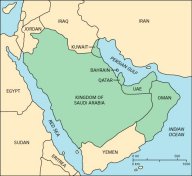


Page 2 of 6
The structure of the GCC consists of the Supreme Council, the Ministerial Council and the Secretariat General:
– the Supreme Council (the highest authority of the GCC) comprises the Heads of State of the six member countries. The Supreme Council meets once a year in ordinary session. Emergency sessions can be convened at any time by the heads of any two Member States. The chairmanship of the Supreme Council is held by each Member State in turn. Resolutions are carried by majority vote. The Supreme Council is responsible for determining the overall policy of the GCC and for ratifying recommendations presented to it by the Ministerial Council or the Secretariat General.
– The Ministerial Council comprises the Foreign Ministers of the six member countries. The Ministerial Council meets once every three months in ordinary session. Emergency sessions can be convened at any time by the Foreign Ministers of any two Member States. The Ministerial Council draws up policies and makes recommendations on means of developing cooperation and coordination amongst Member States in the economic, social and cultural spheres.
– The Secretariat General prepares reports, studies, accounts and budgets for the GCC. It drafts rules and regulations and is charged with the responsibility of assisting Member States in the implementation of decisions taken by the Supreme and Ministerial Councils. The Secretary General is appointed for a three-year period (renewable) by the Supreme Council on the recommendation of the Ministerial Council.

